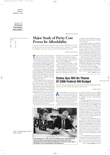Swedish researchers have conducted what appears to be the largest study to date on the roles of maternal age, marital status, and educational level in women with postpartum psychosis—a rare, but very serious psychiatric disorder, linked with a 70-fold increased risk of suicide and a high rate of infanticide.
The researchers followed all Swedish first-time mothers from 1986 to 1997—some half-million women—and found that 339 had been hospitalized for postpartum psychosis. They then attempted to determine whether maternal age, educational level, and marital status (defined as living or not living with the father of one's child) had any association with being hospitalized for postpartum psychosis.
The two factors found to have a positive association were older age and not living with the father of one's child, they reported in the July Acta Psychiatrica Scandinavica.
A link, of course, does not prove causation, but assuming that being older and not living with the father of the child can predispose a woman to postpartum psychosis, then the question is, How might they do so?
One possible explanation is preexisting mental illness, Nada Stotland, M.D., a professor of psychiatry and obstetrics/gynecology at Rush Medical College and vice president of APA, said in an interview. In other words, a mentally ill woman might delay childbearing or have difficulties forming a lasting relationship with the father of her baby. Then, upon giving birth without any social support, the stress might be enough to trigger postpartum psychosis.
“Lack of social support is a very significant risk factor for psychiatric illnesses,” Stotland said.
Another theory for how older maternal age might predispose a woman to postpartum psychosis, Stotland added, is that “older mothers are more likely to have complicated pregnancies and deliveries, another risk factor for psychiatric episodes.”
Nonetheless, Stotland asserted, “Unless and until these confounding variables are explored, these findings should not be taken as rationales to encourage women to have children earlier in life than they feel ready, nor to live with or marry men they don't wish to live with or marry. They do indicate that women who do not have the support of the father of their babies should be offered extra support from society. Although it is optimal for a child to have as many loving relatives as possible, and to have relationships with its parents, many older, single women are able to care for wanted babies without risk of psychotic decompensation.”
A different finding from this study surprised, and concerned, the study's lead author, Kristina Sundquist, M.D., Ph.D., an assistant professor at the Center for Family Medicine at the Karolinska Institute in Stockholm. She and her coworkers had divided their study population into three cohorts by year of delivery. They found that the incidence of hospitalization due to postpartum psychosis decreased significantly during the 1990s, when a substantial reduction in the number of psychiatric beds in Sweden occurred.
“Since rates of hospital admissions due to postpartum psychosis show a high stability over time and across cultures, our findings suggest that the psychiatrist's decision of hospitalization may be influenced by external factors such as a limited access to psychiatric beds,” she told Psychiatric News. “This is alarming because of the potentially fatal nature of postpartum psychosis.”
The study was funded by the U.S. National Institutes of Health, Swedish Council for Working Life and Social Research, Swedish Research Council, Knut and Alice Wallenberg Foundation, Karolinska Institute, and Stockholm County Council.
An abstract of “Are Sociodemographic Factors and Year of Delivery Associated With Hospital Admission for Postpartum Psychosis? A Study of 500,000 First-Time Mothers” is posted at<www.blackwellsynergy.com/doi/abs/10.1111/j.1600-0447.2005.00525.x>.▪
